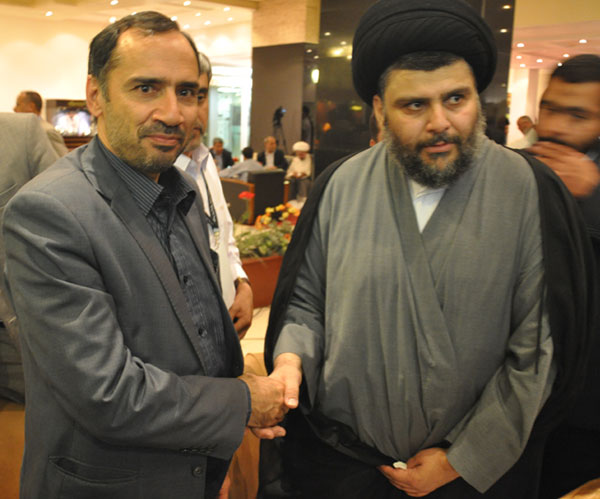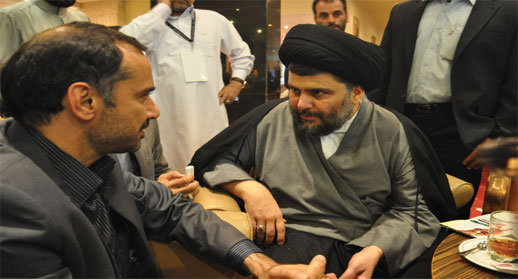| Speaking in a meeting with Secretary-General of Iran's Habilian Association - a human rights group formed by the families of 17,000 terror victims in Iran - Sadr stressed that no one in Iraq likes to see MKO's presence on Iraq's soil. |

http://english.farsnews.com/newstext.php?nn=9006280031
Prominent Iraqi Shiite cleric Moqtada Sadr strongly condemned the crimes committed by the anti-Iran terrorist Mojahedin-e Khalq Organization (MKO) against the Iranian and Iraqi nations, and underlined his country's strong resolve to expel the terrorist group from Iraq.
Speaking in a meeting with Secretary-General of Iran's Habilian Association - a human rights group formed by the families of 17,000 terror victims in Iran - Sadr stressed that no one in Iraq likes to see MKO's presence on Iraq's soil.
"This terrorist group has committed more crimes and oppressions against us than the crimes it has committed against the Iranian nation since the number of martyrs in Iraq is twice the number in Iran. "Therefore, we have a very deep motivation for expelling these criminals from our country," Sadr underscored.

The MKO, whose main stronghold is in Iraq, is blacklisted by much of the international community, including the United States.
The MKO is behind a slew of assassinations and bombings inside Iran, a number of EU parliamentarians said in a recent letter in which they slammed a British court decision to remove the MKO from the British terror list. The EU officials also added that the group has no public support within Iran because of their role in helping Saddam Hussein in the Iraqi imposed war on Iran (1980-1988).
Many of the MKO members abandoned the terrorist organization while most of those still remaining in the camp are said to be willing to quit but are under pressure and torture not to do so.
A May 2005 Human Rights Watch report accused the MKO of running prison camps in Iraq and committing human rights violations. According to the Human Rights Watch report, the outlawed group puts defectors under torture and jail terms.
The group, founded in the 1960s, blended elements of Islamism and Stalinism and participated in the overthrow of the US-backed Shah of Iran in 1979. Ahead of the revolution, the MKO conducted attacks and assassinations against both Iranian and Western targets.
The group started assassination of the citizens and officials after the revolution in a bid to take control of the newly established Islamic Republic. It killed several of Iran's new leaders in the early years after the revolution, including the then President, Mohammad Ali Rajayee, Prime Minister, Mohammad Javad Bahonar and the Judiciary Chief, Mohammad Hossein Beheshti who were killed in bomb attacks by MKO members in 1981.
The group fled to Iraq in 1986, where it was protected by Saddam Hussein and where it helped the Iraqi dictator suppress Shiite and Kurd uprisings in the country. The terrorist group joined Saddam's army during the Iraqi imposed war on Iran (1980-1988) and helped Saddam and killed thousands of Iranian civilians and soldiers during the US-backed Iraqi imposed war on Iran.
Since the 2003 US invasion of Iraq, the group, which now adheres to a pro-free-market philosophy, has been strongly backed by neo-conservatives in the United States, who also argue for the MKO to be taken off the US terror list. The MKO has been in Iraq's Diyala province since the 1980s. Iraqi security forces took control of the training base of the MKO at Camp Ashraf - about 60km (37 miles) North of Baghdad - in 2009 and detained dozens of the members of the terrorist group. The Iraqi authority also changed the name of the military center from Camp Ashraf to the Camp of New Iraq.
